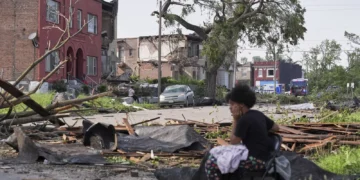The muddy, deserted streets of flood-devastated Princeville, North Carolina silently bear witness to the destruction caused by the Tar River. Princeville, NC, 9/28/99. Photo by Dave Saville/FEMA News Photo.
June 9, 2024 Story by: Editor
Close your eyes and imagine folding time so that the present and the deep past overlap. Around 3 million years ago, whales swam in moonlit seas over what are now the cotton fields and farmlands of Edgecombe County, North Carolina, 100 miles inland from today’s Atlantic Ocean.
During the Pliocene Epoch, a warmer world existed where sea levels were significantly higher, submerging what is now eastern North Carolina beneath the ocean.
These whales swam over the Victorian mansions and plantation homes in the county seat of Tarboro, the old white clapboard church in Princeville, and the sacred site of Freedom Hill, where formerly enslaved Africans established a town at the edge of the Tar River.
Scientists warn that continued fossil fuel consumption and insufficient climate action could cause sea levels to rise a hundred feet, potentially returning the ocean to Edgecombe County.
Princeville was founded at the end of the Civil War by formerly enslaved Africans who fled to Union Army camps on flood-prone land along the Tar River near Tarboro. They named it Freedom Hill because Union soldiers read the Emancipation Proclamation to the liberated people there. Over 150 years, Princeville has endured at least eight major floods, including two “500-year” floods in 17 years: Hurricane Floyd in 1999 and Hurricane Matthew in 2016, which caused hundreds of millions of dollars in damage. Scientists say that the town’s neglected, insufficient levee and climate change will likely lead to more frequent and catastrophic flooding.
The flood risk has driven most businesses away from Princeville, limiting economic opportunities for young people who eventually move elsewhere. The residents of Princeville face the difficult choice between preserving their historically significant home or leaving.
Despite racial intimidation and river inundation, Princeville has persisted. The town’s residents confront dire challenges with courage, refusing to succumb to environmental despair. Their deep roots remain unshaken by the river, and they fight against all odds to save their home.
Climate change is occurring faster than we can adapt, and the window to avoid the worst impacts is quickly narrowing. According to the International Panel on Climate Change, temperatures are on track to rise nearly 3.2 degrees Celsius, reaching or exceeding Pliocene temperatures by 2100 without immediate climate action.
Eastern North Carolina is dotted with portals to this hotter Pliocene Earth. When ancient whales died, their bones settled on the seafloor and fossilized over millions of years. The intense storms that flood Princeville also erode these fossils from creek and river bottoms, revealing remnants of this ancient marine world.
The prehistoric whales beneath Princeville have lessons about climate resilience and solutions. In a symbiotic relationship scientists are just beginning to understand, these whales and tiny plankton played a crucial role in the Earth’s carbon cycle, storing carbon dioxide in the deep sea and helping regulate global temperatures.
Humans are disrupting this cycle. While it took millions of years for greenhouse gases to warm the Pliocene climate, modern humans have existed for only 200,000 years—a blink of an eye on the Earth’s timeline. Yet, burning fossil fuels for just 200 years has raised carbon levels from around 287 ppm to a peak of around 421 ppm in 2022. These levels are higher than they’ve been in about 3.6 to 4.5 million years, when temperatures were 3 to 4 degrees Celsius (5.4-7.2 degrees Fahrenheit) warmer and sea levels were 70 to 80 feet higher.
Our ecological-climate emergency originates from colonialism, extraction, and exceptionalism—from cotton and sugar farming, slavery, whaling, and coal; from the belief that the Earth can support unlimited growth and that humans are separate from nature and geologic time. This mindset legitimized the theft of Indigenous land, invented racial caste systems, and saw whales and Black people as commodities for profit. It results in segregated towns like Princeville.
I have reported and photographed this story since 2019, speaking to over two dozen people, including locals, scientists, experts, historians, government officials, and activists.
Climate change mitigation involves more than altering consumption habits. It provides an opportunity to organize more equitable societies, governments, and economies that work symbiotically with each other and the Earth.
Natural solutions to climate change are all around us: in the cycles of the soil and the sea that sustain all life, and in the ways our ancestors learned to live in reciprocity with other species thousands of years ago. Solutions are found in the relationship that Black people have with the land and through Indigenous knowledge that all life is interconnected, and that humans thrive when cooperating with and giving back to nature. They can be discovered if we imagine a world beyond extraction and profit, listen to the whales, and study the rocks. Source: NC NewsLine

















